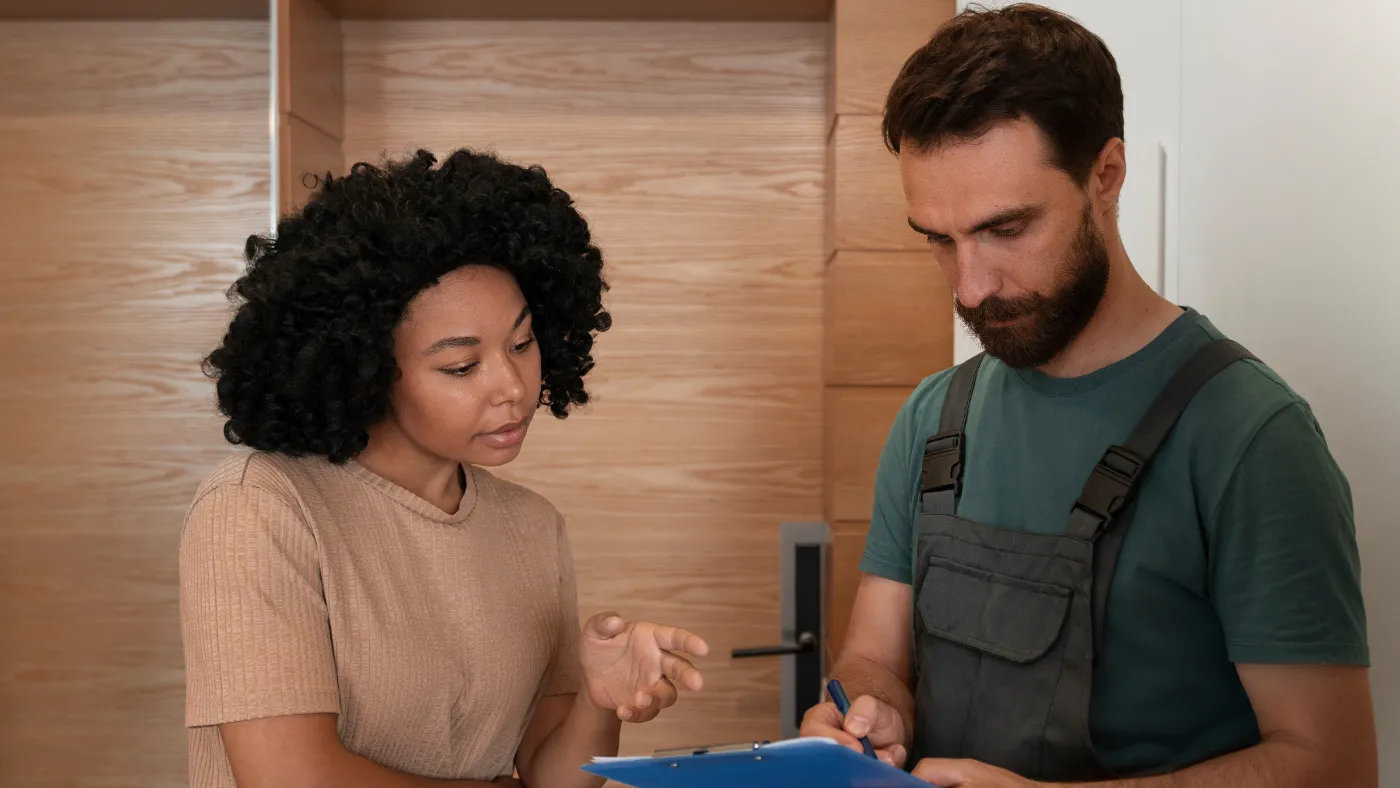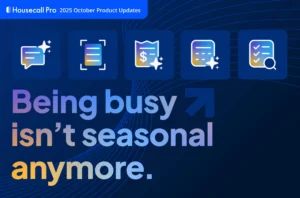Want to win more jobs with less effort?
Grow your business and send quick quotes with our home service software.

Want to see your potential revenue?
See what businesses like yours earn with Housecall Pro in 1 - 2 minutes.

Securing payment for a home service-based job (plumbing repairs, electrical rewiring, cabinet renovation, etc.) ensures you have the funds you need for the project and keeps your business’s cash flow well. But if you’re like many business owners, it feels awkward to ask for upfront payment. We understand, and we appreciate that many customers may not want to pay for the work until it’s done (and they can approve the completed project).
Today, we’re explaining how to politely ask for a deposit, with examples to help you learn to make the words come naturally. Using our field service estimating software can make this process much easier, as you can provide your customer with an itemized list and cost of materials to support your deposit request.
What is a Deposit?
A deposit is an upfront payment, meaning that the client pays a portion of the cost of the job before you start work. It’s included as a clause in the service contract and provides assurance to both parties (you and your customer) about the terms of the job and how it will be completed. The advance deposit is usually subtracted from the final total of the job.
A policy of asking for a deposit can benefit any home-based business, from general contractors to specialty service or installation providers, like Smart Home rewiring or crown molding installation.
Why Are Upfront Deposits Important?
It may feel awkward to ask for an upfront deposit, especially for a brand-new client you want to turn into a repeat customer. But, they’re crucial for running your business, for several reasons:
- Boost Your Cash Flow: Receiving money up front gives you cash you may need to purchase the materials you need to start the job. Cash flow is a persistent problem, especially for smaller home-service-based businesses. Implementing a practice of asking for a partial deposit up front can solve this problem.
- Set Precise Payment Requirements: If you’re like many service-based businesses, you’ve encountered issues of delayed payment or non-payment. Incorporating a deposit requirement into your payment structure lays the foundation for clear communication regarding payment with your customers. The deposit requirement can also screen out customers who may not be serious about paying you.
- Receive Compensation for Your Investment: You may have spent considerable time developing a bespoke estimate for a new client or purchased specialty materials you can’t use on other jobs. A deposit ensures you’re compensated for your investment of time and money. Otherwise, you may be left with nothing if the client suddenly decides to go with another vendor.
Your deposit can cover any upfront costs you incur for a new job, alert your clients that you’re serious about getting paid, and help keep cash flowing for your business so you have the means to purchase materials to take on more new jobs.
When Should You Ask for a Deposit?
You may not need to ask for a deposit for every client every time. If you have a small-value project or are working with a repeat client with a good track record of paying in full and on time, asking for payment upfront could damage your working relationship. Asking for the right deposit at the right time and from the right clients protects your business from losing money on bad jobs.
Instead, follow our guidelines to ensure that your business gets paid and your client still feels valued:
When: Request Deposits Before the Job Starts
Deposits guarantee that the job will be completed according to the contractual terms and that the service provider will be paid.
Your customers may ask, “What is upfront payment?”
It’s money in advice to help cover the cost of materials for a new job, and so should be requested before beginning work. Asking for payment when you’re halfway through a job is bad business practice. It may make your customers doubt your ability to complete the job, and they may question whether you cut corners because you ran out of money for quality materials. The only exception would be on a large, multi-phase project, where you need a cash flow boost, and the customer is notified and agrees in advance. This should be in the contract signed by both parties.
Instead, require the deposit to be paid once your quote is approved. With Housecall Pro’s estimating and invoicing software, you can easily include the deposit in each quote you send. You can determine what percentage of the total should be the deposit, but you should stipulate that it be received before you begin work.
Who: Ask New Clients for a Deposit
It’s fairly common across the home-based service industry for providers (plumbers, electricians, HVAC techs, and construction and renovation contractors) to ask for a deposit from new customers.
It doesn’t really make sense to suddenly start asking for deposits from existing clients if you never have before and if they are reliable for payment. The only exception may be when you’re taking on a new, larger-scope project or one requiring unusual materials you need to purchase upfront.
Why: Require Deposits Only for Certain Projects
Deposits don’t have to be restricted to new clients. You may also implement a practice of requiring deposits for certain projects (such as ones you know are exceptionally time-consuming) or those valued over a certain amount.
Your business may offer a range of services, from easier, low-cost maintenance or repairs (like winterizing HVAC systems or getting these systems ready for summer) to intricate, long-term, and expensive projects (like converting a building to run on solar power).
If you get push-back from a new client requesting a large project, or if they’re balking at your request for payment for materials before you begin work, you may want to take a step back and evaluate whether this is a client you really want to work with. If they’re being difficult about a very reasonable request for upfront materials purchase, then they may be more likely to drag their feet on payment or may start requesting changes that increase the scope and expense of the project once you’ve already begun.
What: Pre-Assign Deposit Requirements for Certain Services
Go through your service list and determine which types of jobs should require deposits and which shouldn’t. When you use Housecall Pro’s field service software, you can easily flag the jobs that require a deposit, so it populates when you generate your invoice for the client.
Adding the deposit to the quote and a link for online payment streamlines the process for you and makes it easy for the client to pay the deposit online. Once the client pays the deposit, you can schedule the project and get to work.
How: Always Make Sure Your Deposit Requirements Comply With State Laws
Each state sets its own limitations for the amount of a deposit that service-based businesses can request from customers. And, your state may have certain regulations regarding financing; if you offer financing options for larger projects, ensure that your quotes are compliant with these regulations, too.
If you don’t have a business lawyer or a professional accountant, it’s a good investment of your time and money to have one of these professionals review your proposed deposit structure to ensure that you don’t inadvertently violate state laws.
Now that you know when to ask for an upfront deposit, let’s explore how to calculate it.
How to Calculate the Deposit Amount
Expect clients to ask why you require a specific deposit amount. Explaining how you arrived at the pre-payment amount and what it covers assures them that you’re taking the job seriously (and aren’t planning on flaking on them) and that you have a solid reason and purpose for asking for money upfront.
First, calculate your total cost of the job (labor, materials, and other affiliated costs). This gives you the break-even amount for pricing. Then, review what other businesses in your area are charging for the same projects, which ones require deposits, and how much they require.
If you’re the only business charging a deposit for certain jobs, it may impact how many of these jobs you book.
The amount you require for the deposit should be based on the final estimate you give your client. Potential clients should be provided with all the information about the cost, timeframe, and scope of the project before they agree to it.
Some common ways to calculate deposits include:
- Percentage of the total job: 20-50% of the total cost (labor and materials) is a fairly normal range that covers most of your expenses, so you’re set up to begin work
- Full cost of materials: Provides you with the funds you need to purchase everything you need for the job, protecting you from losing money on purchasing materials you won’t use if the client cancels
- Standard non-refundable fee: Incorporate a $250 fee into all your quotes so you maintain cash flow for your business and begin the business relationship in good faith. You can subtract the fee from the client’s final cost
- Charge 50% for all large jobs: Larger-scope projects require more commitment of time, labor, and materials and usually have a larger upfront expenditure for your business. Assessing a partial payment ensures that you and the client are both committed to the bigger project.
Get In Touch: 858-842-5746
Let us earn your trust
On average, Pros increase monthly revenue generated through Housecall Pro by more than 35% after their first year.
See plan options and feature breakdown on our pricing page.
Asking for a Deposit Politely & Professionally
So now you know the reasons you need to ask for a deposit, how much to ask for, and even how to incorporate it into your quote. But what do you say?
Below, we’ve provided some samples of what to say in different formats. You can adapt these to fit your business and personality, but always be sure to use clear, direct, and specific language about the amount of the deposit, what it’s for, and when it’s due.
How To Ask for a Deposit Politely: Samples of What To Say
You can adapt these phrases to fit your personality and industry:
- “To move forward with your project, we require a deposit of [amount]. This covers initial material costs and secures your place in our schedule.”
- “We’re excited to get started! To prepare materials and reserve your service date, we kindly ask for a deposit of [amount].”
- “As part of our standard policy, a deposit of [amount] is required to cover materials and secure your project start date. Let us know if you have any questions!”
- “A deposit of [amount] helps us purchase the necessary materials and block off time for your job. We appreciate your understanding and look forward to getting started!”
How to Ask for a Deposit via Email
If you informed your customer about the deposit over the phone or via text, it’s good to follow up with an email quote that includes the deposit request and a payment link. Make it as easy as possible for your customers to pay you!
Feel free to adapt our sample letter requesting deposit payment templates below:
Professional and Friendly
Hi [Client Name],
Thank you again for choosing [Company Name]! We’re excited to work with you on your upcoming project.
Attached to this email is Invoice [invoice number] for [description of work]. The total comes to [$0.00], with a deposit of [$0.00] due by [due date of deposit].
You can make payment by [credit card] following the instructions provided here: [payment instructions].
Once the deposit is received, we’ll reach out to coordinate your project’s start date.
If you have any questions, feel free to contact us at [phone number] or [email address].
Best regards,
[Your Name]
[Company Name]
Straightforward and Clear
Hi [Client Name],
Thanks for getting in touch with us! The team at [Company Name] is looking forward to getting started on your project.
Please find Invoice [invoice number] attached for [description of work]. The total is [$0.00], and a deposit of [$0.00] is due by [due date of deposit].
Payment can be made via [credit card]. You’ll find instructions here: [payment instructions].
Once the deposit is complete, we’ll follow up to schedule a start date.
If you need anything, don’t hesitate to reach out at [phone number] or [email address].
Best,
[Your Name]
[Company Name]
Warm and Reassuring
Hi [Client Name],
We truly appreciate you reaching out, and we’re looking forward to working with you on this project!
Attached is Invoice [invoice number] for [description of work]. The full amount is [$0.00], and a deposit of [$0.00] is due by [due date of deposit] to move forward.
To make things easy, you can pay by [credit card] using the following instructions: [payment instructions].
Once we receive your deposit, we’ll be in touch to finalize scheduling.
If you have any questions or need help with anything, feel free to contact us at [phone number] or [email address].
Warm regards,
[Your Name]
[Company Name]
How to Ask for a Deposit via Estimate
If you use professional estimating software to send your quotes and estimates to clients, it’s simple to add a line item for a deposit request and incorporate it into each estimate.
You can also train your teams in the field to mention the deposit requirement if they are creating an estimate for a client on-site. For example, you may have snaked a drain for a client but discover that their pipes are thin or have small pinhole leaks. Your tech can generate a quote for sealing or replacing the affected pipes on the spot and include the deposit in the quote they give your customer.
Housecall Pro Makes it Easy to Collect Deposits from Clients
If you think this article has made it easier for you to politely ask for upfront payment, you’ll have an even easier time putting our tips into practice with Housecall Pro’s field service business software. Our software streamlines the back-office work for home service-based businesses, from estimates to recurring service agreements.Best of all, we offer a free 14-day trial of Housecall Pro. We’re sure you’ll love the simplicity of our home service business solutions and field service mobile app for your teams in the field.







